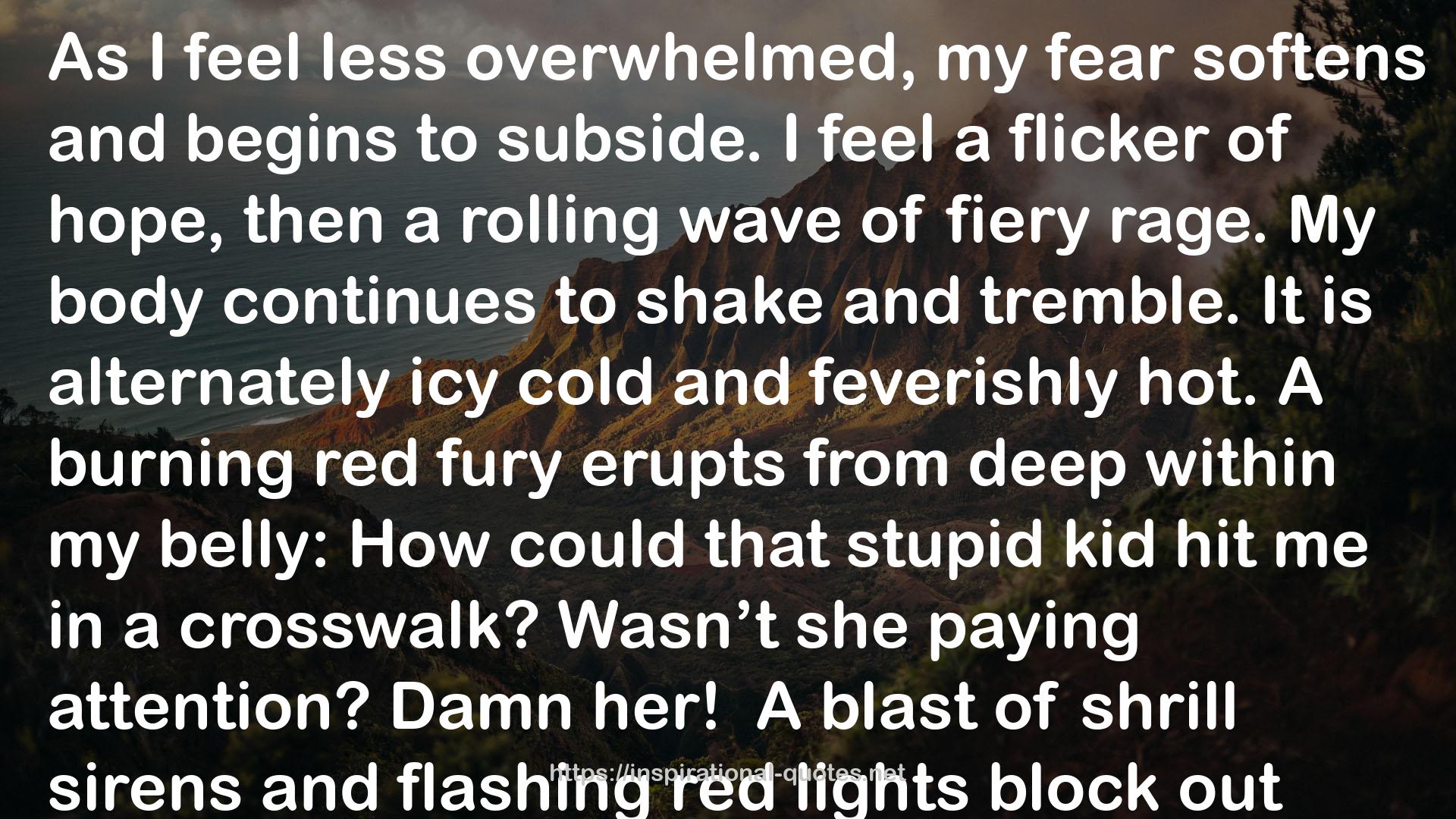2
" The door suddenly jerks open. A wide-eyed teenager bursts out. She stares at me in dazed horror. In a strange way, I both know and don’t know what has just happened. As the fragments begin to converge, they convey a horrible reality: I must have been hit by this car as I entered the crosswalk. In confused disbelief, I sink back into a hazy twilight. I find that I am unable to think clearly or to will myself awake from this nightmare.
A man rushes to my side and drops to his knees. He announces himself as an off-duty paramedic. When I try to see where the voice is coming from, he sternly orders, “Don’t move your head.” The contradiction between his sharp command and what my body naturally wants—to turn toward his voice—frightens and stuns me into a sort of paralysis. My awareness strangely splits, and I experience an uncanny “dislocation.” It’s as if I’m floating above my body, looking down on the unfolding scene.
I am snapped back when he roughly grabs my wrist and takes my pulse. He then shifts his position, directly above me. Awkwardly, he grasps my head with both of his hands, trapping it and keeping it from moving. His abrupt actions and the stinging ring of his command panic me; they immobilize me further. Dread seeps into my dazed, foggy consciousness: Maybe I have a broken neck, I think. I have a compelling impulse to find someone else to focus on. Simply, I need to have someone’s comforting gaze, a lifeline to hold onto. But I’m too terrified to move and feel helplessly frozen. "
― Peter A. Levine , In an Unspoken Voice: How the Body Releases Trauma and Restores Goodness
3
" Highly traumatized and chronically neglected or abused individuals are dominated by the immobilization/shutdown system. On the other hand, acutely traumatized people (often by a single recent event and without a history of repeated trauma, neglect or abuse) are generally dominated by the sympathetic fight/flight system. They tend to suffer from flashbacks and racing hearts, while the chronically traumatized individuals generally show no change or even a decrease in heart rate. These sufferers tend to be plagued with dissociative symptoms, including frequent spacyness, unreality, depersonalization, and various somatic and health complaints. Somatic symptoms include gastrointestinal problems, migraines, some forms of asthma, persistent pain, chronic fatigue, and general disengagement from life. "
― Peter A. Levine , In an Unspoken Voice: How the Body Releases Trauma and Restores Goodness
12
" Woede/tegenaanval is een consequentie van herhaaldelijke, door angst geactiveerde immobiliteit. De andere consequentie is het intreden van de dood. Die dient zich bijvoorbeeld aan als de kat de muis voortdurend blijft vangen en de cyclus zich heel vaak herhaalt. De kat slaat zijn prooi zo vaak dat de muis uiteindelijk zo diep in de toestand van immobiliteit gaat dat hij sterft, hoewel hij niet gewond is. Het gebeurt zelden dat iemand werkelijk sterft van angst. Wat wel veel voorkomt is dat getraumatiseerde individuen door het leven gaan zonder het gevoel te hebben dat ze leven of bij het leven betrokken zijn. Zij zijn leeg tot in de kern van hun wezen. 'Ik loop nog wel rond, maar ik ben er niet meer,' vertelt een slachtoffer. 'Ik ben leeg, koud... ik kan net zo goed dood zijn.'
Chronische immobiliteit veroorzaakt de emotionele kernsymptomen van een trauma: gevoelloosheid, isolement, het gevoel vast te zitten, hulpeloosheid, depressie, angst, verschrikking, woede en wanhoop. De persoon blijft angstig, hij of zij kan zich niet voorstellen wat het is om niet meer belaagd te worden door een niet-aflatende (innerlijke) vijand en is niet in staat weer aan het leven deel te nemen. Mensen die een langdurig en diepgaand (chronisch) trauma hebben overleefd omschrijven zichzelf als 'levende doden'. "
― Peter A. Levine , In an Unspoken Voice: How the Body Releases Trauma and Restores Goodness

